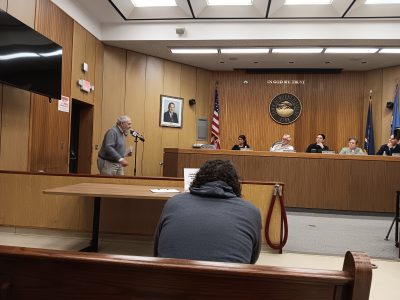Mt. Pleasant Spending Tops $300G on Voting Rights Case in First Quarter
News Based on facts, either observed and verified directly by the reporter, or reported and verified from knowledgeable sources.

The Mount Pleasant Town Board approved more than $300,000 in legal bills last week from the high-powered law firm defending the municipality against several residents who have charged that its voting system is racially polarized.
Baker Hostetler, which has represented prominent Republicans on issues throughout the United States, was paid $308,098.33 for services rendered starting in January when they were retained through Mar. 31.
Last year, five Mount Pleasant residents announced they would challenge the town under the 2022 New York State Voting Rights Act alleging that because the town is about 19 percent Hispanic, those voters almost never have a candidate of their choice win a town election. The Village of Sleepy Hollow is about half Hispanic.
Despite the steep legal bill, Supervisor Carl Fulgenzi said last week there is no second-guessing on the Town Board’s part about spending the money to defend what they believe is a fair system of voting. It is expected that legal fees will continue to grow at a similar rate in the second quarter of the year, he said.
Fulgenzi argued that no one prevents any eligible resident from casting their ballot, and in a town that has more registered Democrats than Republicans, the GOP continues to win town elections.
He said the apparent goal of state Democrats is to monopolize every level of government in New York.
“We’ve reached out to the New York State Republican Committee, the county and federal as far as their support on this whole thing because if the Town of Mount Pleasant goes down on this, so does everybody else,” Fulgenzi said.
“The goal is one-party rule. That’s what they want. That’s not fair to the public. We have never had an issue with people saying my vote doesn’t count. Everybody has the ability to vote. We don’t stop anybody from voting.”
Last year, when the town was challenged, it hired a consultant to analyze the town’s voting data during the previous six local elections, an action that is required under the state law. In November, consultants Dr. Lisa Handley and Jeffrey Wice concluded that the candidates of choice for Hispanic voters have had virtually no chance of winning town elections.
The town could opt to go to a ward system, use ranked choice voting or adopt some other remedy to even the playing field, the consultants stated.
Fulgenzi and other town officials have said that there have been Hispanic candidates run for and win seats on the village boards in Pleasantville and Sleepy Hollow, and that if there was a ward system, for example, there voice would be overwhelmed because they would only have one of four council seats.
David Imamura, an attorney for the plaintiffs, said he remained confident his clients will be successful in the case because the facts are clearly on their side under the law.
“There’s no question the Hispanic community has been unable to elect candidates of their choice,” he said. “That’s why the town is fighting this. There’s no question that in a town where a town councilman is calling for the Hispanic members of the town to leave the town, where you can literally go to jail if you let a migrant into your home, there’s no question that the town is taking action counter to the interest of the Hispanic community.”
Imamura was referring to the state of emergency invoked by Fulgenzi last year that prohibits migrants from being harbored after it was learned that the JCCA was working to house 25 unaccompanied minors at the Cottage School. Imamura also characterized a comment by then-councilman-elect Mark Saracino at a Nov. 20, 2023, public hearing on the Voting Rights Act as him telling residents who don’t believe they are properly represented to leave Mount Pleasant.
Rather, Saracino had said that one option for the residents of the Village of Sleepy Hollow rather than litigation was to explore becoming a co-terminus town-village, similar to what several other municipalities in the state have done previously, including Mount Kisco.
The next step in the case is motions for summary judgment that are due to the court in mid-August.
Clarification: In the original posting of this article, an attribution was missing regarding attorney David Imamura’s interpretation of Mount Pleasant Councilman Mark Saracino comments at the public hearing last November. Saracino’s position on that point has also been added for greater context.

Martin has more than 30 years experience covering local news in Westchester and Putnam counties, including a frequent focus on zoning and planning issues. He has been editor-in-chief of The Examiner since its inception in 2007. Read more from Martin’s editor-author bio here. Read Martin’s archived work here: https://www.theexaminernews.com/author/martin-wilbur2007/
